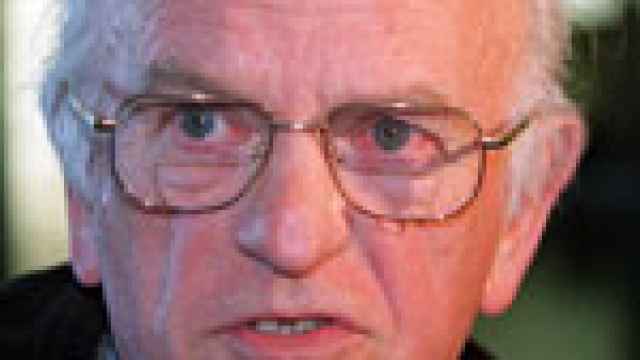 AP Lord Judd | |
"My analysis remains absolutely clear. A valid referendum cannot take place by 23 March," Judd, who reported on Chechnya for the Parliamentary Assembly of the Council of Europe, said in a statement.
He called for the delay after a visit to Chechnya last week, saying that voters were insufficiently educated about the referendum and the security situation prevented proper preparations for it.
"Were the referendum to go ahead for the planned date, I would have failed to persuade the Russian authorities to accept my analysis. In those circumstances I would have no alternative but to resign," Judd's statement said.
A day earlier, the PACE session under way in Strasbourg, France, passed a resolution calling for tighter security, greater transparency and guaranteed voter access during the March 23 plebiscite, but did not include Judd's recommendation to postpone it -- handing a diplomatic victory to Russia.
Moscow had opposed Judd's call for a delay, but it prompted President Vladimir Putin to order officials to do a better job laying the groundwork, saying Russia's reputation depended on it.
The planned referendum has been touted by federal authorities as a sign that life in Chechnya is returning to normal despite daily violence, thousands of refugees and miserable living conditions in much of the republic. Security Council chief Vladimir Rushailo said Thursday that Moscow had a way to go before regaining control there: "The reconstruction process and the counter-terrorism operation is not yet ensuring normalcy in the republic," Interfax quoted Rushailo as saying.
The plebiscite will give Chechens a chance to vote on a local constitution, which would determine the relationship between the republic and Moscow.
An emotional and frustrated Judd told television reporters that, during Wednesday's vote on the resolution, he had been so concerned with an amendment submitted by the Russian delegation that he failed to notice the omission of his call for a postponement. "I believe this was a grave and inexcusable error of judgment on my part," said Judd, who also co-chaired a joint working group of PACE and the State Duma.
PACE, Europe's top human rights watchdog, was to review Judd's resignation request Friday, with a final decision to be made next Wednesday, Interfax reported.
Russian officials either welcomed or simply respected Judd's decision to step down and applauded PACE's rejection of his proposal to defer the plebiscite.
"Judd will be asked to stay on. ... But we say, 'Good riddance!'" Duma Deputy Dmitry Rogozin, who heads Russia's PACE delegation, told Interfax. "He's been disoriented lately: When he comes to Chechnya, he no longer tries to get reliable, objective information; instead, he purposefully seeks out particular information that seems to fit into an existing mold."
Rogozin had criticized Judd earlier this week, saying that "if PACE continues pressing for another date for the referendum, Russia will raise the issue of replacing Lord Judd as the assembly's rapporteur on Chechnya."
Rogozin said Wednesday that he believed Judd was under political pressure, possibly from Chechen rebel representatives such as Akhmed Zakayev.
"Lord Judd is a respected politician. If he made such a decision, it is his choice and must be respected," Ingushetia's president, Murat Zyazikov, told Interfax. Zyazikov praised Judd for his objective assessment of the refugee situation in Ingushetia, which neighbors Chechnya and has absorbed thousands of people who have fled the republic.
But Moscow-appointed Chechen leader Akhmad Kadyrov accused Judd of being inconsistent and basing his judgments about the republic on scant data.
"His position is to say one thing when he's there [in Chechnya] and then to say the opposite when he returns [to Europe]," Interfax quoted Kadyrov as saying.
Kadyrov complained that Judd's assessment that the republic is ill-prepared to hold the referendum was based on "three-hour meetings at refugee camps where 80 percent of the people are [rebel leader Aslan] Maskhadov's."
"I think the main reason for Judd's resignation was that political time in Chechnya has gone forward and he can't keep up," presidential aide Sergei Yastrzhembsky said in Washington.
Yastrzhembsky's comment was a clear reference to the changed political climate since the terror attacks of Sept. 11, 2001, after which Russia revved up its efforts to cast the Chechnya war as part of global fight against terrorism. Yastrzhembsky was on an official visit to give the United States information backing up Moscow's request that Washington designate several Chechen militant groups as international terrorist organizations.
Despite PACE's ultimate endorsement of the referendum date, Wednesday's resolution said it was "unlikely" that the necessary conditions would be met in time and included harsh language on the republic's human rights situation.
"The assembly remains distressed by the number of killings of politically active individuals, by repeated disappearances and the ineffectiveness of the authorities in investigating them, as well as by the widespread allegations and indications of brutality and violence against the civilian population in the republic," the resolution said.
"The Russian authorities seem unable to stop grave human rights violations in Chechnya. ... The assembly deplores the climate of impunity which consequently reigns in the Chechen republic and which makes normal life in the republic impossible."
At the start of Judd's tenure, in January 2000, Russia barely avoided the suspension of its PACE membership due to human rights abuses in the republic.

